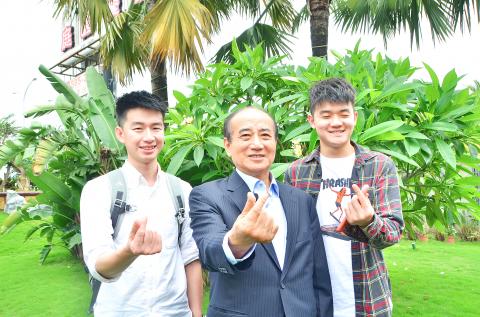Chinese Nationalist Party (KMT) Legislator-at-large Wang Jin-pyng (王金平) on Friday said that if elected president, he would launch negotiations between the government and opposition parties to coin a new term to replace the so-called “1992 consensus.”
“People in the KMT and those in the pan-blue and pan-green camps are in disagreement over the term’s definition,” Wang said.
“The DPP [Democratic Progressive Party] claims that it is synonymous with ‘one country, two systems,’ which is likely not convincing,” he said.

Photo: Wu Chun-feng, Taipei Times
The KMT and China each have their own interpretation of the term, with some KMT members advocating “one China, different interpretations” and Beijing touting “one China, same interpretation.”
“Any definition that involves ‘interpretation’ is not the answer,” said Wang, who announced his bid to run for president in March.
With the term sparking divisions domestically and across the Taiwan Strait, he would hold negotiations between the ruling party and opposition parties to discuss whether to replace the “consensus” with a new term, while leaving open the option to “keep using it,” he said.
Meanwhile, former president Ma Ying-jeou (馬英九) and former New Taipei City mayor Eric Chu (朱立倫) said that “one China” could only mean the Republic of China (ROC).
Hon Hai Precision Industry Co (鴻海精密) chairman Terry Gou (郭台銘), another KMT presidential hopeful, during an interview with CommonWealth Magazine said that he would never only say “1992 consensus,” but rather “1992 consensus and ‘one China, different interpretations.’”
“For the Zhonghua minzu [ethnic Chinese, 中華民族], there is one ROC and one People’s Republic of China,” Gou said.
Ma said that he took Gou to mean that the “one China” in “one China, different interpretations” refers to the ROC.
Chu, who in December last year announced that he would join the KMT’s presidential primary, urged all KMT members to heed the “consensus” as defined in the party’s “peace platform” as well as its “historical context.”
It is the KMT’s unwavering stance that “one China” refers to the ROC, he said.
Commenting on Gou’s remarks, National Taiwan Normal University professor of political science Fan Shih-ping (范世平) said that Gou’s latest cross-strait stance was not different from that espoused in the DPP’s Resolution on Taiwan’s Future or the “special state-to-state relationship” theory of former president Lee Teng-hui (李登輝).
China’s silence on Gou’s remarks could mean one of two things, he said.
One, it has been too preoccupied to respond, Fan said.
Two — which would be “alarming” — Gou has gained Beijing’s consent before making the remark, which would mean that the two sides had conspired together to formulate a plot to win the support of swing voters or borderline DPP supporters, he said.
The “1992 consensus — ” a term former Mainland Affairs Council chairman Su Chi (蘇起) in 2006 admitted that he made up in 2000 — refers to a tacit understanding between the KMT and the Chinese government that there is “one China,” with each side having its own interpretation of what “China” means.
Additional reporting by Hsiao Fang-chi

CHAOS: Iranians took to the streets playing celebratory music after reports of Khamenei’s death on Saturday, while mourners also gathered in Tehran yesterday Iranian Supreme Leader Ayatollah Ali Khamenei was killed in a major attack on Iran launched by Israel and the US, throwing the future of the Islamic republic into doubt and raising the risk of regional instability. Iranian state television and the state-run IRNA news agency announced the 86-year-old’s death early yesterday. US President Donald Trump said it gave Iranians their “greatest chance” to “take back” their country. The announcements came after a joint US and Israeli aerial bombardment that targeted Iranian military and governmental sites. Trump said the “heavy and pinpoint bombing” would continue through the week or as long

TRUST: The KMT said it respected the US’ timing and considerations, and hoped it would continue to honor its commitments to helping Taiwan bolster its defenses and deterrence US President Donald Trump is delaying a multibillion-dollar arms sale to Taiwan to ensure his visit to Beijing is successful, a New York Times report said. The weapons sales package has stalled in the US Department of State, the report said, citing US officials it did not identify. The White House has told agencies not to push forward ahead of Trump’s meeting with Chinese President Xi Jinping (習近平), it said. The two last month held a phone call to discuss trade and geopolitical flashpoints ahead of the summit. Xi raised the Taiwan issue and urged the US to handle arms sales to

BIG SPENDERS: Foreign investors bought the most Taiwan equities since 2005, signaling confidence that an AI boom would continue to benefit chipmakers Taiwan Semiconductor Manufacturing Co’s (TSMC, 台積電) market capitalization swelled to US$2 trillion for the first time following a 4.25 percent rally in its American depositary receipts (ADR) overnight, putting the world’s biggest contract chipmaker sixth on the list of the world’s biggest companies by market capitalization, just behind Amazon.com Inc. The site CompaniesMarketcap.com ranked TSMC ahead of Saudi Aramco and Meta Platforms Inc. The Taiwanese company’s ADRs on Tuesday surged to US$385.75 on the New York Stock Exchange, as strong demand for artificial intelligence (AI) applications led to chip supply constraints and boost revenue growth to record-breaking levels. Each TSMC ADR represents

State-run CPC Corp, Taiwan (CPC, 台灣中油) yesterday said that it had confirmed on Saturday night with its liquefied natural gas (LNG) and crude oil suppliers that shipments are proceeding as scheduled and that domestic supplies remain unaffected. The CPC yesterday announced the gasoline and diesel prices will rise by NT$0.2 and NT$0.4 per liter, respectively, starting Monday, citing Middle East tensions and blizzards in the eastern United States. CPC also iterated it has been reducing the proportion of crude oil imports from the Middle East and diversifying its supply sources in the past few years in response to geopolitical risks, expanding